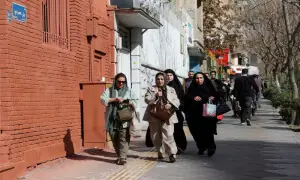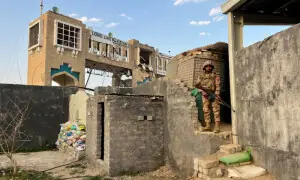Developing countries need $6.8tr by 2030 to implement climate actions: PM Shehbaz
4 min readDeveloping countries need an estimated $6.8 trillion by 20230 to implement climate actions, known as Nationally Determined Contributions (NDCs), Prime Minister Shehbaz Sharif said on Tuesday.
“Climate financing is an urgent need of the hour,” he told a Climate Finance Round Table Conference organised by Pakistan on the sidelines of the two-day World Leaders Climate Action Summit, also known as COP29, currently being held in Azerbaijan’s capital of Baku.
“Developing countries need to deliver Nationally Determined Contributions and need an estimated $6.8 trillion by 2030 to implement less than half of their current NDCs.”
He urged donor nations to honour their pledges, which should amount to 4.7 per cent of their gross national product (GNP) and to take advantage of available climate funds.
“One such commitment is a $100 billion annual climate pledge established a decade ago at COP15 [which] is now reported by OECD to have reached only $160 billion,” PM Shehbaz said.
The premier reiterated that debt should not be the standard approach in climate financing, advocating for a return to non-debt solutions that would enable countries to fund their climate initiatives effectively.
He was of the view that debt should not be considered the “acceptable new normal” in climate financing, highlighting the difficulties faced by developing countries within the global climate finance system.
“Despite years of promises and commitments, gaps are widening, creating significant barriers to achieving the goals of the UN Framework Convention on Climate Change (UNFCCC).”
“We are at a pivotal moment where the global climate finance framework needs to be redefined to adequately support vulnerable nations,” PM Shehbaz stated.
He pointed out that financing through loans only exacerbates the debt burdens of developing countries, leading them into what he termed “mounting debt traps,” which he described as “death traps.”
Pakistan can relate to the “agony and pain of other vulnerable countries”, PM Shehbaz said and mentioned the two devastating floods in the recent past.
“In 2022, one-third of Pakistan was under water and the country had to repurpose all development and climate funds for financing basic relief and humanitarian efforts,” he said.
According to the Global Climate Risk Index 2021, the South Asian country ranks among the top 10 countries most vulnerable to climate change. The nation has been grappling with increasingly frequent and severe weather events, including unprecedented floods, intense monsoon rains, extreme heat waves, rapid glacial melting, and glacial lake outburst floods.
During the 2022 monsoon season, Pakistan experienced catastrophic floods linked to climate change, resulting in the tragic loss of at least 1,700 lives. The disaster affected 33 million people and destroyed vast areas of agricultural land, leading to an estimated $30 billion in damages, as reported by government sources.
In June 2024, a heat wave set new record-high temperatures, further exacerbating challenges to public health and agriculture. These events highlight the urgent need for comprehensive climate action and support for vulnerable nations like Pakistan.
PM Shehbaz interacts with world leaders at COP29 summit
Prime Minister Shehbaz interacted with the global leaders as they gathered here to participate in the opening plenary “World Leaders’ Climate Action Summit”.
Azerbaijan President Ilham Aliyev and United Nations Secretary General Antonio Guterres received the prime minister as he arrived at the summit venue, according to a PM Office press release.

As the participating leaders gathered for a family photo, PM Shehbaz held an informal interaction with them and exchanged pleasantries besides discussing matters of mutual interest.
He interacted with UAE President Sheikh Mohamed bin Zayed Al Nahyan and discussed matters of mutual interest including bilateral cooperation in the climate change field.
During interaction with Turkish President Recep Tayyip Erdogan and Turkish First Lady Emine Erdogan, the two sides discussed ways to cooperate in highlighting the issues of climate change and environmental pollution at the international level.
Also, read this
YouTube making money off new breed of climate denial, monitoring group says
2023 was world’s hottest year on record, EU scientists confirm
In their informal interaction, PM Shehbaz and UK Prime Minister Sir Keir Starmer exchanged views on the promotion of the Pakistan-UK relationship.
He also met Uzbek President Shavkat Mirziyoyev and Tajikistan President Emomali Rahmon and discussed protection of glaciers and water resources in Pakistan and Central Asia as well as the strengthening connectivity with both the countries.
PM Shehbaz also interacted with Nepal President Ram Chandra Poudel and Bangladesh Chief Adviser Dr Muhammad Yunus. He discussed the issue of increasing temperature in South Asia, risks posed by rising sea levels, and the conservation of forests with them.
For the latest news, follow us on Twitter @Aaj_Urdu. We are also on Facebook, Instagram and YouTube.




























Comments are closed on this story.